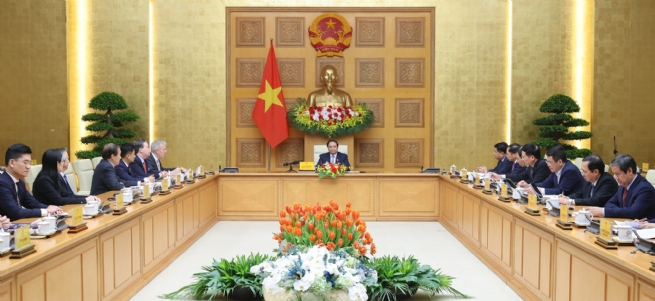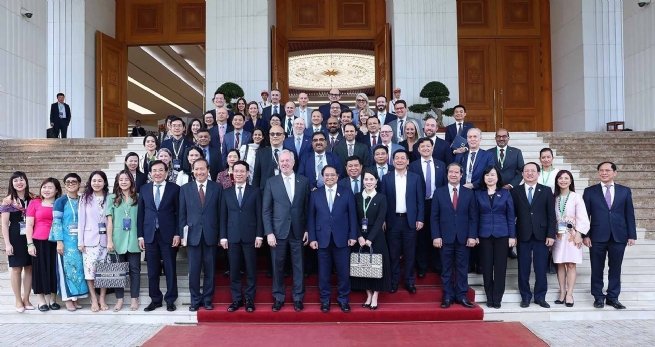9:36:01 AM | 4/3/2024
Anticipated trends suggest a surge in U.S. investment in Vietnam, driven by heightened investor interest in sectors such as clean energy, semiconductors, manufacturing and financial services. This evolving landscape presents an opportunity for Vietnamese enterprises to enhance their competitive edge and deepen their integration into global supply chains.

Prime Minister Pham Minh Chinh chairs the meeting with the delegation of 60 U.S. enterprises led by the U.S.-ASEAN Business Council (USABC), Hanoi, March 21, 2024
U.S. businesses seek to invest in many fields
A robust delegation of 60 U.S. enterprises recently embarked on a visit to Vietnam, led by the U.S.-ASEAN Business Council (USABC), to explore potential avenues for investment and business collaboration. This marks the second consecutive year that Vietnam has played host to a significant contingent of U.S. business delegations, keen on identifying lucrative investment opportunities. The scale of this delegation is the largest since the elevation of the comprehensive strategic partnership between the two countries in 2023. The visiting corporations span a diverse range of sectors, including technology, automotive, energy, aviation, manufacturing, hospitality and tourism.
The delegation included industry leaders such as the tech behemoth Meta, aviation stalwart Boeing, and renewable energy producer GE Vernova. Other notable participants included Koch Industries, UL Solutions - a company specializing in safety science, Chubb Insurance Group, Roblox - a gaming company, ATMO - a weather forecasting provider, and AES - an energy firm.
At the working meeting with Vietnamese Prime Minister Pham Minh Chinh, USABC President and CEO Ted Osius said: US investors appreciate the business environment in Vietnam and strongly commit to further investing in science and technology, electronics, aviation, electric vehicles, logistics, energy, healthcare, finance, e-commerce, food and tourism. Technologically, the US is committed to helping Vietnam develop the semiconductor manufacturing industry, a complicated business that requires many factors to be successful such as a qualified workforce, the readiness of domestic partners and stable energy sources.
The visiting enterprises unveiled a series of new investment initiatives during their visit. Notably, PepsiCo announced plans to invest in the construction of two state-of-the-art factories, both powered by renewable energy. These include a US$90 million food production facility in Ha Nam province and a beverage production plant in Long An province, with an investment exceeding US$300 million. These significant investments underscore the strong interest of U.S. investors in the ASEAN region, with Vietnam emerging as a particularly attractive destination.
In fact, since the two countries officially upgraded their relationship to the highest level-Comprehensive Strategic Partnership, the presence of US businesses in Vietnam has become increasingly evident. Leading US corporations like Intel, Coca-Cola and Cargill have currently poured billions of US dollars of investment capital into Vietnam. Apple has completed relocating 11 audio-visual equipment factories to Vietnam. Accordingly, Apple's partners including Foxconn, Luxshare and Goertek have also simultaneously expanded their investment in Vietnam.
As per the data by the Foreign Investment Agency (FIA), the Ministry of Planning and Investment (MPI), U.S. enterprises have made substantial investments in Vietnam, exceeding US$11.8 billion across more than 1,340 projects. This places the U.S. as the 11th largest foreign investor in terms of investment value. Geographically, the investments are primarily concentrated in regions such as Ba Ria-Vung Tau, Ho Chi Minh City, Binh Duong and Da Nang.
By industry, U.S. investors mainly invest in accommodation and food services, processing and manufacturing, water supply and waste treatment, transportation and warehousing.

Prime Minister Pham Minh Chinh and the delegation of the U.S.-ASEAN Business Council (USABC)
Opportunities for Vietnamese businesses
According to economic experts, the fact that giant U.S. firms continuously arrive in Vietnam to explore opportunities and seek for investment expansion will open up good opportunities, not only to diversify but also improve the quality and value of FDI flows. In particular, the presence of famous U.S. investors in Vietnam will be a strong magnet to U.S. companies and investors from other countries to Vietnam.
Moreover, the influx of U.S. FDI plays an important role in Vietnam’s economic development, with capital being directed toward large-scale, high-tech projects. This investment aids Vietnam in establishing a firm presence within the global supply chain. Given its status as a global technology leader, the United States offers invaluable learning opportunities for the Vietnamese workforce, fostering skill development and knowledge transfer.
Vietnam is focusing on attracting selective investments, prioritizing projects in sectors such as high technology, electronics, semiconductors, innovation, renewable energy, new energy sources like hydrogen, modern financial services, trade centers, infrastructure construction, and research and development. These are sectors where the U.S. has demonstrated considerable strength and expertise.
To attract foreign investment, including U.S. funds, the Vietnamese government is committed to keeping a stable economic and political environment, focusing on human resource training and development, developing green economy and enabling digital transformation. At the same time, the government advocates ensuring the harmony of interests among people, businesses, the government and investors on the basis of harmonized benefits and shared risks.
Prime Minister Pham Minh Chinh articulated a commitment to support and accompany U.S. businesses in their investment and operational endeavors in Vietnam, as part of the concrete realization of the Comprehensive Strategic Partnership between the two nations. The Vietnamese government has pledged a triad of guarantees and collaborative efforts.
The “Three Guarantees” included: Ensuring that the FDI sector remains an important component of the Vietnamese economy, with a commitment to respect, encourage and facilitate its long-term development; Guaranteeing the legitimate and legal rights and interests of investors, fostering a spirit of “harmonized benefits, shared risks”; Providing assurance of political and policy stability to instill confidence in investors for long-term business engagement.
The “Three Joint Efforts” included: A commitment to active listening and understanding, fostering a collaborative relationship with businesses and the people; Sharing a common vision and concerted actions for economic development, with the aim of elevating bilateral relations to new heights; A pledge to work together, enjoy together, win together, and develop together, fostering a spirit of mutual growth and prosperity.
Prime Minister Chinh hoped that U.S. businesses and Vietnam will achieve the above goals; jointly respond to global and all-people challenges such as climate change, population aging, epidemics and resource depletion.
Mr. Ted Osius said that U.S. businesses proposed that Vietnam continue improving its legal framework, reforming administrative procedures, especially investment licensing, work permits and visas. They also urged Vietnam to continue to provide tax incentives in priority sectors, promote circular economy, green economy, green transportation, carbon emissions reduction and energy transition, and develop infrastructure and logistics to enable their more effective operations in the country.
By Thu Ha, Vietnam Business Forum